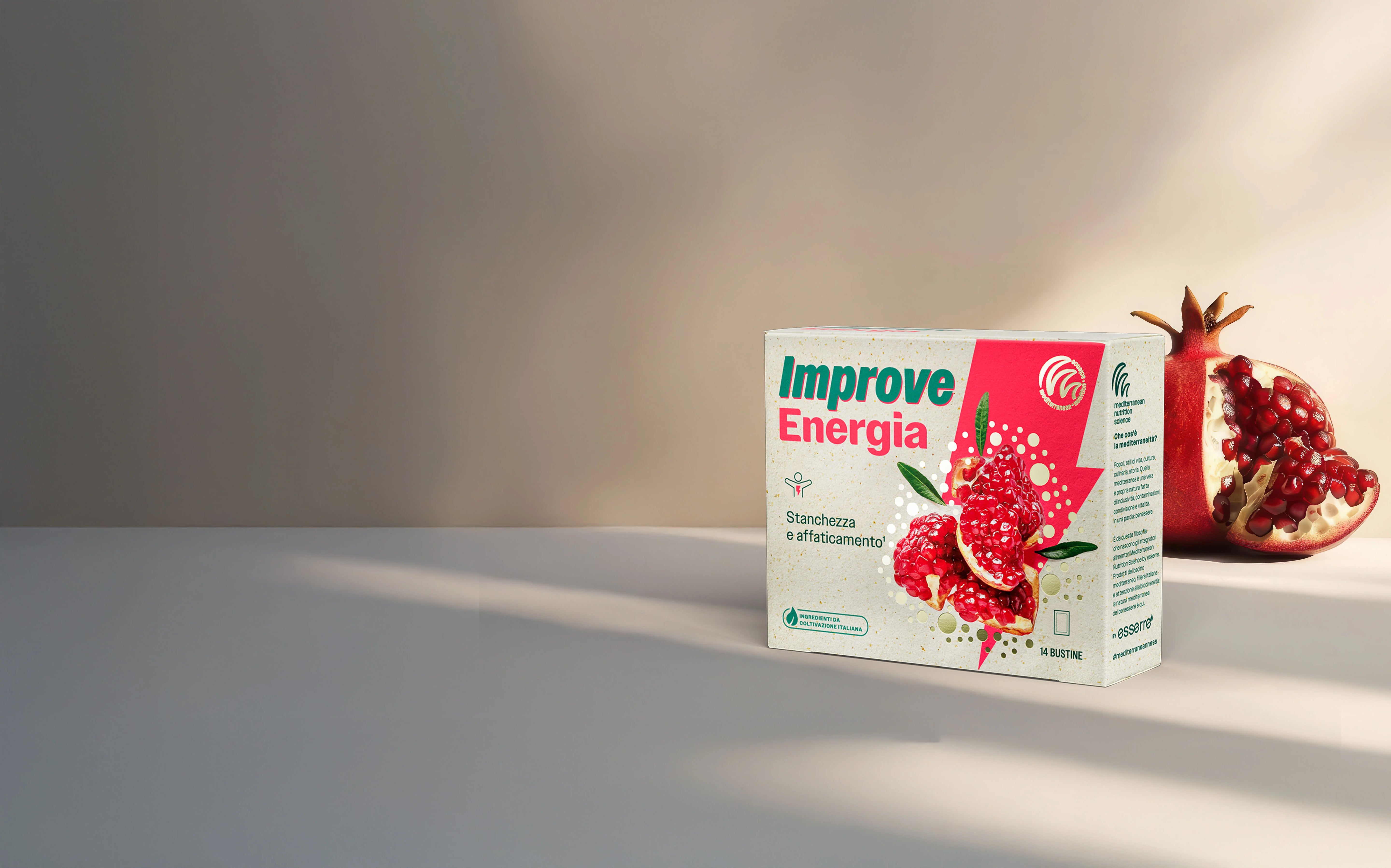
Wellness Guide
Energy and vitality

Increase energy and vitality
In today's fast-paced world, maintaining high energy levels is essential to achieving personal and professional success.
From a scientific point of view, energy is provided by food and is used to maintain the structural integrity and functionality of the body's biochemical processes.
For the general population, energy is associated with a feeling of well-being and vitality that translates into the individual's ability to carry out daily physical or mental activities and maintain social relationships.
Energy and tiredness are interconnected concepts, in fact tiredness is often described and perceived as a lack of energy, a feeling of low vitality or "inability to do anything".
Main factors that influence energy levels
Diet
Diet
Foods help meet both energy needs and specific micronutrients involved in energy metabolism. Your diet should be varied, healthy and balanced and include fruits, vegetables, whole grains and lean proteins. A diet high in sugar and processed foods can lead to fluctuations in blood glucose levels, causing energy spikes and dips.
Quality and quantity of sleep
Quality and quantity of sleep
Sleep is essential for rejuvenating your body and mind. Adults typically need 7-9 hours of sleep per night. Poor or insufficient sleep can significantly impact your energy levels, cognitive function, and mood.
Physical activity
Physical activity
Regular exercise improves energy levels by releasing endorphins, which are known to have a positive effect on mood and overall well-being.
Additionally, exercise increases the delivery of oxygen and nutrients to tissues and cells, including the brain, providing a boost of energy.
Hydration
Hydration
Dehydration can cause fatigue and weakness because water is essential for many bodily functions, including transporting nutrients and regulating body temperature. Even mild dehydration can affect physical performance, mood, and concentration.
Mental health
Mental health
Stress, depression, or anxiety can cause fatigue, insomnia, difficulty concentrating, and a lowered immune system. Managing stress through mindfulness, therapy, and relaxation techniques can help maintain energy levels.
Pathologies
Pathologies
Autoimmune diseases (e.g. systemic lupus erythematosus, multiple sclerosis, type 1 diabetes, celiac disease, chronic fatigue syndrome and rheumatoid arthritis, thyroid disorders) can affect energy levels.


Improve® ENERGY
Targeted support for your daily energy.
If you often feel tired or low in energy, Improve® Energy helps you regain momentum and vitality. Thanks to its ingredients, it helps reduce tiredness and fatigue and supports the normal function of the immune system. A simple gesture, every day, to feel more present, active and in harmony with your rhythms.
Tips to Increase Energy Levels
Functional nutrition
A balanced and varied diet is the basis of stable energy levels. Give priority to complex carbohydrates, such as whole grains, legumes and vegetables rich in fiber: they release energy gradually, avoiding glycemic peaks and sudden drops. Also pay attention to foods rich in iron: a deficiency can cause fatigue. To improve the absorption of non-heme iron (present in vegetables), combine sources of vitamin C such as citrus fruits or lemon juice. Finally, B vitamins and magnesium are directly involved in the production of cellular energy: they should never be missing.
Regenerating rest
The quality of your sleep has a profound effect on your perceived energy. Following a consistent nighttime routine, limiting the use of electronic devices before bed, maintaining a comfortable temperature and an orderly environment in your bedroom promote deeper rest. Avoid caffeine, alcohol, and large meals in the evening. Sleeping well is not a luxury, it is a priority for feeling active during the day.
Daily movement
Even a simple walk can increase energy levels and reduce mental fatigue. Exercise improves tissue oxygenation, stimulates endorphins, and combats chronic fatigue. A balanced program should include both aerobic activities and toning and resistance exercises. Consistency is more important than intensity: find an activity you enjoy and do it regularly.
Stress Management
Chronic stress is one of the main causes of constant tiredness. Techniques such as deep breathing, meditation, mindfulness and yoga help calm the nervous system and rebalance the energy level. Cultivating rewarding hobbies and taking breaks during the day can also help you regenerate.
Hydration and micronutrients
Often overlooked, hydration is essential to maintaining high energy. Even mild dehydration can cause drowsiness, difficulty concentrating, and fatigue. Drink at least 2 liters of water a day, increasing if you are physically active or in hot weather. Supplement with foods rich in potassium, magnesium, B vitamins, and C to support metabolic processes related to energy production.

Find energy and vitality every day
Small daily changes can make a big difference. A balanced diet, restful sleep, regular exercise, and proper hydration help maintain high energy levels. Reducing stress, engaging in rewarding activities, and cultivating social relationships are also key allies in feeling more active and present.

